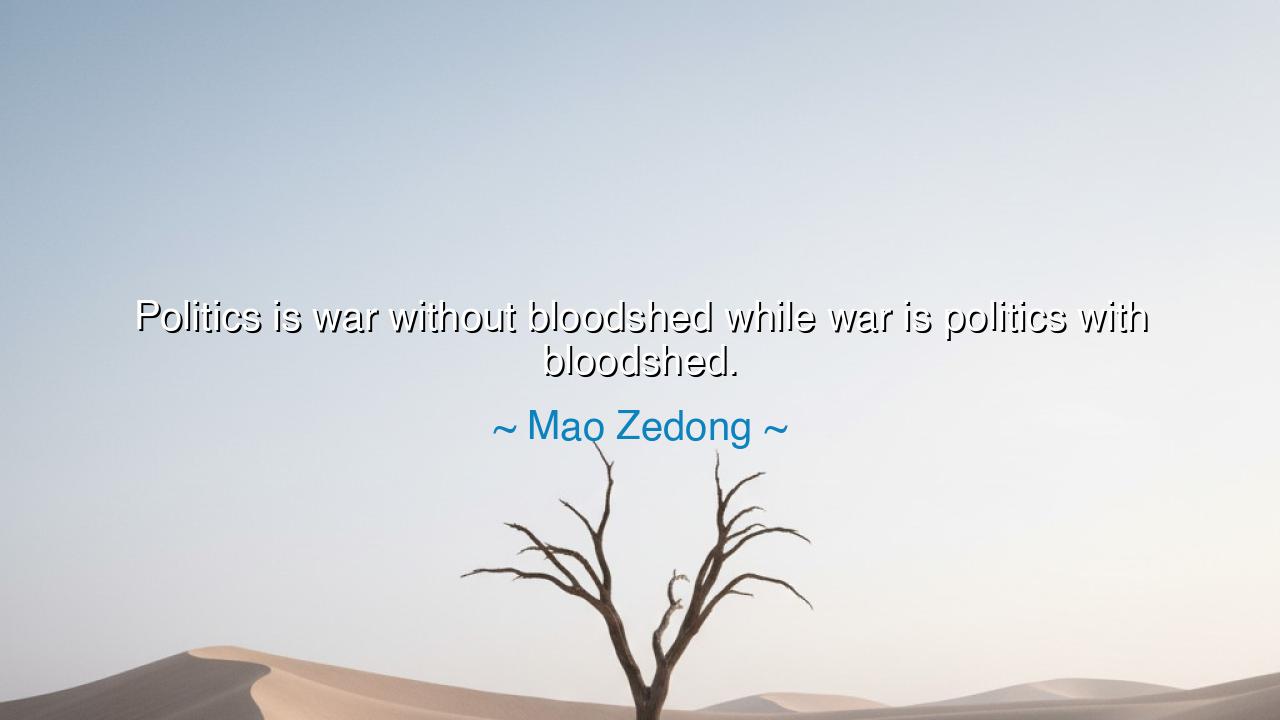
Politics is war without bloodshed while war is politics with






Mao Zedong, the revolutionary who carved his place upon the tumultuous stage of the twentieth century, declared: “Politics is war without bloodshed while war is politics with bloodshed.” In this saying, we hear not the gentle musings of a philosopher but the fierce clarity of a man who lived amidst uprisings, civil conflict, and the forging of a new order. His words unveil the hidden kinship between the council chamber and the battlefield, between the speech of leaders and the clash of armies. They remind us that behind every negotiation, every alliance, every law, there lies the shadow of struggle.
To say that politics is war without bloodshed is to reveal that human governance is never free from contest. Parties compete, ideologies collide, ambitions clash. But instead of swords and guns, the weapons are words, laws, votes, and persuasion. Victory may be measured in influence rather than territory, in policies rather than fortresses. Yet the spirit is the same: the striving for power, the contest for direction, the relentless struggle over the destiny of people. Politics is but war waged with the pen and the tongue instead of steel.
Yet when the bonds of restraint are broken, when dialogue fails and compromise collapses, then war emerges — politics with bloodshed. The same forces that shape political contests — greed, ideology, pride, vision — spill into the open field of violence. The council chamber is abandoned, and men return to the ancient law of force. Thus Mao teaches that war and politics are not opposites, but two forms of the same struggle, divided only by whether blood is shed.
Consider the Chinese Civil War itself, which Mao lived and led. It began as a political struggle between the Nationalists and the Communists, fought through speeches, rallies, reforms, and debates. Yet the divisions grew too deep, the ambitions too fierce, and so the dispute crossed from politics into war. Villages were burned, soldiers perished, and rivers ran red. What began as politics with words became politics with blood. Mao, who had seen both faces of this truth, framed his words to remind future generations that the difference between politics and war is not of kind, but of degree.
This teaching is not confined to China alone. Think of the American Civil War. For decades, the issue of slavery was fought in the halls of Congress, in newspapers, in debates between statesmen. Politics bore the burden of the conflict. But when no compromise could hold, when words failed, the matter was settled in four years of terrible war, where hundreds of thousands perished. Politics became war with bloodshed, but it was still the same struggle: who shall rule, and under what vision of justice.
The lesson is not to despair, but to recognize the sacred power of politics. If politics is war without bloodshed, then it is the higher form of struggle, the one that spares lives. It is the battlefield where ideas clash so that swords need not. The failure of politics leads to war; the success of politics preserves peace. Thus, Mao’s words are not only a revelation but a warning: honor the work of dialogue, for it is the last barrier before the spilling of blood.
Therefore, my children, let this teaching guide you. Do not disdain politics as petty or corrupt, for it is the arena where conflict is tamed, where war is transmuted into words. Participate in it with courage and with wisdom. Learn to argue fiercely, but also to compromise. Support leaders who value peace over pride, who labor to keep struggles in the realm of speech and law, rather than letting them descend into the fire of war. For if we neglect this duty, politics will fail, and the ancient darkness of bloodshed will return.






AAdministratorAdministrator
Welcome, honored guests. Please leave a comment, we will respond soon